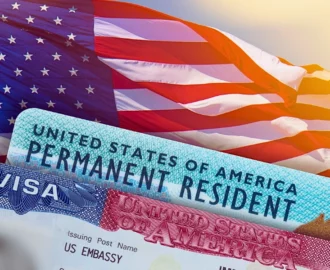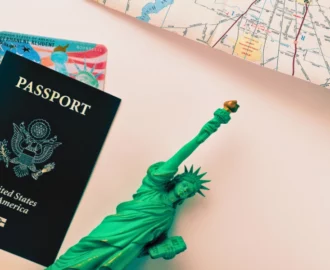Three reasons immigration applications are denied include inadequate documentation, a criminal history, and inconsistent details on an immigration application. Additionally, there are other reasons for application denials that you should avoid to keep the application process smooth and successful.

If you need help with immigration applications or need to avoid deportation and other immigration issues, an immigration attorney in Chicago can help. To speak with an attorney, call The Law Offices of Cheng, Cho, & Yee, PC, at 312-853-3088.
Top 3 Reasons Immigration Applications Are Denied
Each year, U.S. Citizenship and Immigration Services (USCIS) approves approximately 88% of applications for lawful permanent residency (LPR) and issues denials in 12% of cases. The following are a few reasons USCIS may deny your application.
Lack of Proper Documentation
Many denials result from the failure to include sufficient documentation when applying for a green card, such as a family- or marriage-based green card.
This risk is why it’s crucial to determine what documentation you need for your application and to include all of it. The USCIS website and other immigration resources can detail what documentation you need to submit to successfully apply for your green card category. Each category will have unique requirements, making it important to learn the details of your particular category.
Immigration legal services attorneys can also assist with the application process and ensure you have all the required documentation in place before submitting the application.
Criminal History
USCIS might also deny your application if you have a history of criminal convictions involving specific types of crimes.
These crimes include:
- Crimes of “moral turpitude,” including murder, bigamy, fraud, and many other potential crimes that show that an applicant displays “poor moral character”
- Convictions of two or more crimes with prison sentences of five years or longer
- Convictions involving controlled substances, including possession and trafficking
- Prostitution-related crimes
- Human trafficking-related crimes
These crimes can involve either convictions or arrests that might render you ineligible for a green card.
An attorney can inform you whether your criminal history puts your immigrant application at risk based on previous convictions or admissions.
Inconsistent Information
Some applications may include inconsistent information, such as different details about the applicant’s name, contact information, marital status, and more. If any of this information is misaligned and inaccurate, USCIS will likely deny the application.
While many immigrant applicants unintentionally include inconsistent information, some may attempt to provide USCIS with false details. However, USCIS can easily determine which information is correct.
Double-check your application and all supporting documentation to ensure all information is correct and consistent across your documents, which will help increase your chances of a successful application.
Other Reasons Immigration Applications Are Denied
In addition to the aforementioned reasons, there are some other factors that can result in an immigration application denial, such as:
Health Problems
You should receive a formal medical exam to confirm that you are in good health and won’t pose a health risk when entering the U.S. For instance, you must not have any diseases that could spread among the general populace, and you must have received all necessary vaccinations.
Medical professionals can help confirm with medical records that you don’t have communicable diseases and that you are current with all vaccinations.
Security Risks
You may be ineligible for a green card if you appear to pose a risk to national security. For instance, USCIS may suspect that you are connected to terrorist organizations or that you are otherwise entering the country in bad faith.
An attorney can help show that you are entering the country without posing a security risk of any kind with the right documentation.
How an Immigration Attorney Can Help With Immigrant Applications
If you’re worried about being ineligible for immigration into the U.S. and want to ensure your green card application is successful, you can benefit from hiring a reputable lawyer with experience handling immigration cases.
The following are some ways an immigration lawyer will help you with your case:
Determining Eligibility for a Green Card
One key way an immigration lawyer can assist you with the application process is to figure out whether you’re eligible for a specific visa category.
There are several visa categories you can use to legally enter the country, such as family-based green cards, marriage-based green cards, and worker visas. You could also enter the country as an asylum seeker if you need to avoid persecution in your country of origin, or you may qualify to enter the country as a special immigrant in a critical area of expertise.
An attorney can answer specific questions regarding your case, such as, “What is an investor visa?” and “What determines eligibility to work in the United States?” The answers to these questions and others can help you identify the best visa category for your situation.
Gathering Accurate and Consistent Supporting Documents
To succeed with your application, you must have all required supporting documentation that can further prove eligibility for the chosen visa category.
There are many types of supporting documents you may need for your case, such as:
- A copy of your birth certificate
- A marriage certificate proving marital status
- Two passport-quality photos
- Proof that you have maintained a legal residency status in the U.S.
- Documentation from potential employers showing proof of work eligibility
These are simply some of the many documents that you may need, depending on your visa category. An attorney can help you identify and collect all of them for use in an application, keeping all information accurate throughout to prevent a potential denial.
Interview Preparation
Applicants must undergo an interview with immigration officials before receiving approval for their applications. This process can be stressful and uncertain, but a lawyer will be able to answer questions ahead of the interview and indicate what to expect with this process.
For instance, your attorney could let you know what kinds of questions officials are likely to ask and the answers you should provide. You’ll also learn which types of documents to obtain and bring to your interview to facilitate the process.
Filing a Motion to Reconsider, Reopen, or Appeal
As discussed, there are several reasons immigration applications are denied. If USCIS denies your application for any reason, an attorney may be able to help you reverse this decision.
For example, an attorney could decide to file a motion to reconsider if you believe USCIS made an error when denying your application. The attorney could prove this error and have USCIS reconsider your application with newly detailed facts around your case.
If a motion to reconsider isn’t viable, the attorney may decide to file a motion to reopen instead. This process would involve gathering and organizing evidence to support your application that wasn’t available at the time of the initial application. However, this excludes evidence or documentation that applicants could have accessed during the application process and simply overlooked.
For certain applications, such as marriage-based green card applications, your attorney could also choose to file an appeal to the Administrative Appeals Office (AAO) if you believe that USCIS denied the application in error. In these instances, new immigration officials would independently review the details of your application to determine whether it’s possible to overturn the previous officials’ decision.
Figuring Out Which Forms to File
Whenever you want to take action, whether filing an initial application, a motion to reconsider, or an appeal, you must file the right forms with immigration services.
A lawyer familiar with the application and appeals processes will help you find and complete the appropriate forms based on your situation. In the process, you can simplify your application and ensure that you’re correctly completing it.
For instance, you might need to adjust your immigrant status at some point, warranting the submission of Form I-485, while filing an appeal or motion would require you to complete Form I-290B, Notice of Appeal or Motion.
Getting Help With the Application Process
To avoid the many reasons immigration applications are denied under USCIS, work with an experienced immigration attorney to discuss your case. A lawyer can help you complete the application process or reverse a denial, depending on your circumstances.
Good attorneys understand the challenges that immigrants can face during the application process and work to ensure they’re able to overcome them. For help from a reputable immigration attorney in Chicago, turn to The Law Offices of Cheng, Cho, & Yee, PC. To schedule a consultation with our attorneys, contact us online today, and we’ll connect you with a lawyer for assistance.




